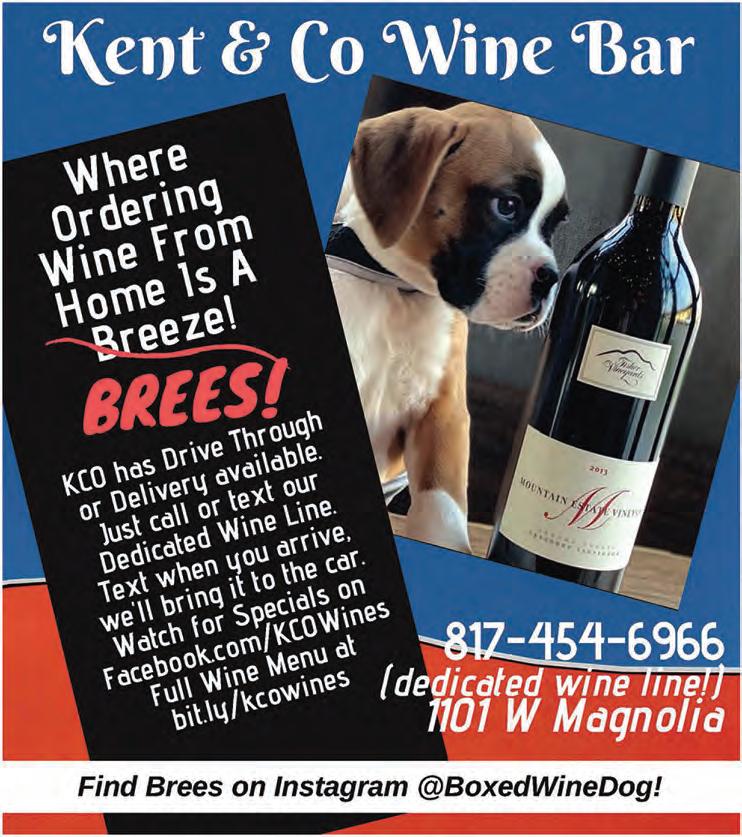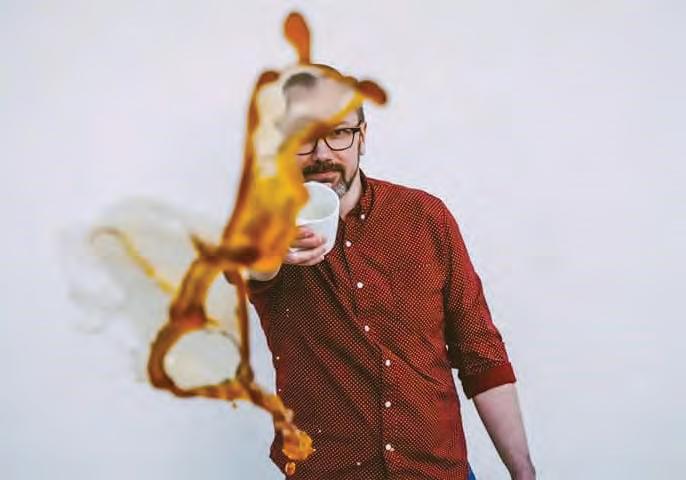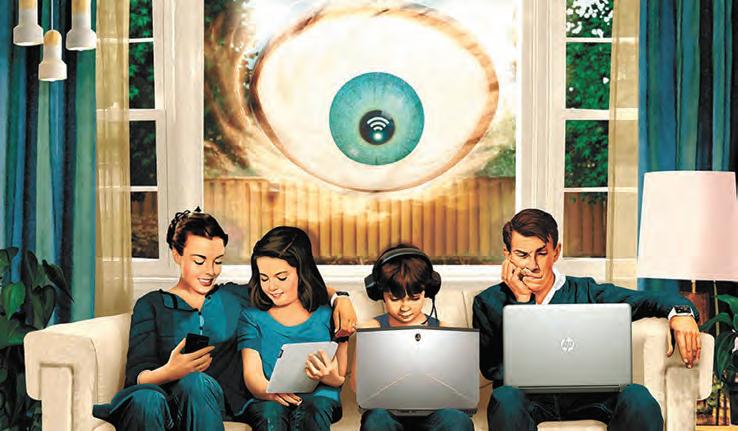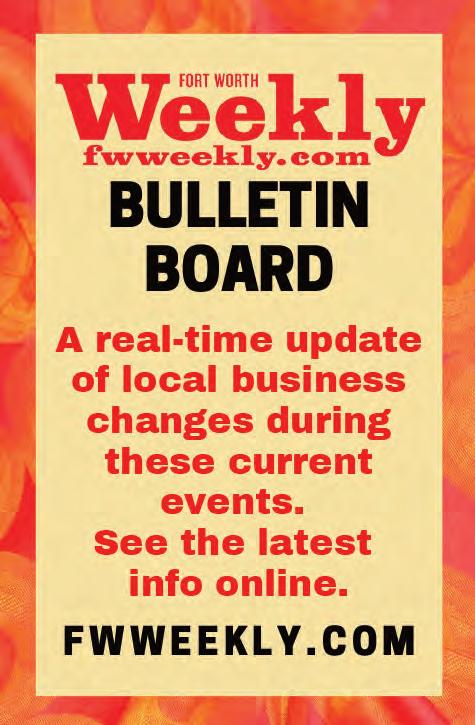
10 minute read
Metro
METROPOLIS
Empty Tables Some local watering holes are peeved Phase 2 excluded them.
BY MEGAN ABLES
Lisa Little-Adams believes it’s “disappointing, to be sure.” The owner of the Near Southside cocktail lounge Proper “cannot make sense of how [state leaders] are rationalizing allowing certain businesses to open and not others,” including bars like hers.
Though in April Gov. Greg Abbott said he intended for bars to reopen by “mid-May,” the second phase of his plan to reopen Texas gradually which he announced on May 5 included only nail salons, hair salons, barbershops, swimming pools, and indoor wedding/event venues, all subject to the 25% capacity mandate and social distancing guidelines.
Starting May 18, office buildings, nonessential manufacturers, and gyms can reopen with 25% occupancy, under the condition that employees must avoid congregating and maintain social distancing. Gyms are permitted to reopen under the requirements that showers and locker rooms must remain closed (but restrooms may be open), equipment must be disinfected after each use, customers must wear gloves, and individuals must maintain 6-foot social distancing.
Little-Adams pointed out that tattoo studios and massage parlors necessitate more physical contact than bars, yet bars were put in the same category as them when referring to their reopening.
She said, “I was so curious, in fact, I sent a request to the governor’s office and asked for them to help explain it to me.”
She received the automated response: “Your request for assistance will be reviewed by the appropriate staff member.”
Little-Adams added, “Nothing really to be done except wait.”
Morgan Roberts was also disappointed that bars were not included in Phase 2. “It seems a little unfair that the bars haven’t been given the go-ahead to open up,” said the owner of The Local in Crockett Row, “while almost every other business has gotten the green light. I don’t see much difference in being able to grab a drink at a restaurant bar opposed to an establishment that just serves” drinks.
The Local is part of the Texas Bar and Nightclub Alliance, and Roberts said the group is pushing to get bars reopened.
“They’ve put together a 10-point plan for us to follow, so we’re hoping to get news from them,” he said.
Glen Keely, co-owner of Poag Mahone’s Irish Pub in the West 7th corridor and Thompson’s Bookstore downtown, doesn’t understand why churches can place mass amounts of people under one roof, yet he can’t have 20 people in a bar to have a couple beers.
“We have the same protocols as restaurants,” Keely said, “so [the coronavirus] wouldn’t spread any more differently than it would in any of the other businesses. I’m not a scientist, though, so I can’t judge. We can only do what’s in our power.”
Keely took the governor’s plan for restaurants and applied it to his operations. “Most of the stuff was already things that
Static
N9500: Mr. Clean As the coronavirus crisis was ramping up in mid-March, John Tepper remembered watching the news from his Carrollton home and wondering how hospitals were going to handle sanitizing hundreds of masks per day. The entrepreneur and medical device development consultant knew that the highly infectious COVID-19 was going to force medical workers to burn through personal protective equipment (PPE) at unprecedented levels.
“The news was already talking about the shortage of PPE, especially with masks,” Tepper recalled.
Tepper had just finished developing a device that decontaminates dermatological instruments. Surely, he thought, someone is working on something similar that can use UltraViolet Germicidal Radiation (UVGI) to decontaminate and sanitize masks. Tepper realized that what hospitals, cities, and other groups really needed was a portable, easy-to-use device that could kill pathogens on N95 respirators (the mask of choice for many medical professionals) and other medical masks.
He bounced the idea off his friend and frequent business partner Ab DeWeese, who is also a physicist. When an online search found that no such products existed, DeWeese and Tepper brought on two additional business partners, Tim Hissam and Rusty Rose, and formed Hepius Equipment. The team worked quickly to develop a prototype that was the size of a small office printer.
DeWeese and Tepper have extensive experience in developing and testing medical devices. After our online meeting, DeWeese sent me a slew of links from the Centers for Disease Control and Prevention (CDC), National Institutes of Health, and scholarly journals that basically described UVGI’s singular effectiveness at obliterating the RNA that allows the novel coronavirus to wreak havoc in the bodies of hosts.
Within two weeks of forming Hepius Equipment, the team had a working prototype that caught the interest of administrators at Parkland Memorial Hospital in Dallas. The Parkland staffers recommended a few modifications that were quickly completed. The initial N9500 order was delivered to Parkland last week, Tepper said. The N9500 has a minimum setting of one minute of UVGI radiation emission. The device is powered by a standard electric cord.
“Hepius equipment worked with our Infectious Disease team at Parkland Hospital,” Parkland said in a statement. “The N9500 met our rigorous requirements on the first try. Parkland Hospital loves the N9500.”
DeWeese and his team work with potential clients, often in consultation with the purchasing group’s medical director, to decide what the ideal setting should be. For Parkland’s purposes, seven minutes of UVGI radiation emission was ideal, Tepper said.
Some large hospitals may have centralized decontamination capability, but those dedicated operations are labor-intensive, and many nurses and doctors would prefer to know that their personal mask is returned and not accidentally switched with someone else’s, DeWeese said.
The barely month-old business is in talks with Fort Worth economic developer Robert Sturns, DeWeese added. Mobile testing sites, police stations, fire stations, Tarrant County Jail, and Fort Worth hospitals are all potential clients for the $8,599 device.
Through a succession of executive orders issued by Gov. Greg Abbott, Texans are in the process of reopening businesses and public spaces. Reopening stores and offices will mean providing masks to employees who may have little to no knowledge on how to properly handle the PPE, DeWeese said.
“As we launch in the great reopening, hopefully, we don’t have to do it a second time” if people are properly using masks and other PPE, DeWeese said.
Tepper said that Hepius Equipment is just one of the thousands or possibly tens of thousands of small businesses in the United States that have thrown all of their resources into tackling a specific problem posed by the novel coronavirus.
“Most of us have been part of large companies,” Tepper said. “They have a lot of resources, but they also have
Parkland Hospital: “The N9500 met our rigorous requirements on the first try. Parkland Hospital loves the N9500.” Courtesy of Hepius Equipment
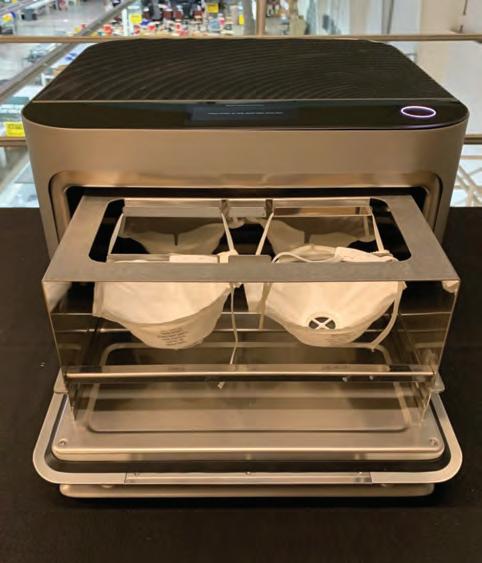
to be accountable to owners and stockholders. If you have a great idea, you have to pitch the idea from management up to the board of directors to get resources. Small businesses can be much more agile. I called Ab, and by the end of the week, we had Tim and Rusty onboard and a prototype within two to three weeks. We can’t do everything, but we think we can do this one thing really well and really quickly.” — Edward Brown
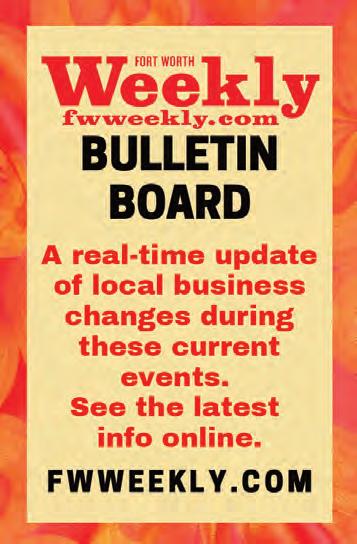
Member of the North Central Texas Farmers Market Corporation
Featured Farmer
Shine’s Farmstand
If you’ve ever visited the Cowtown Farmers Market on a Saturday morning, you’ve likely met Charlie Blaylock. Charlie runs Shine’s Farmstand, a local biointensive micro-farm that uses sustainable and organic techniques to grow fresh local fruit and vegetables year ‘round. In addition to running his farm (since 2013), he’s also the Cowtown Farmers Market manager and an activitist in the local food environment, serving on the board of the Tarrant County Food Policy Council. This week at Shine’s booth you can find salad mix, radishes, turnips, red and gold beets, rainbow chard, soap made by his wife Laura, and – if you are really lucky and an early riser – eggs! You can also find Shine’s produce at Ellerbe Fine Foods.
Saturdays 8 a.m. – Noon MARKET OPEN YEAR ‘ROUND
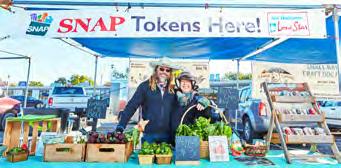
3821 Southwest Blvd. (Benbrook Traffic Circle)
cowtownmarket.com HAVE A LONE STAR CARD?
we did to stay within being right with the food and health department,” Keely said. “They were normal business practices, and we can ramp that up and do more. We gave point-by-point examples on how we can do that, and we were met with the generic re- sponse from a strike force team that they got our email, thanks.”
There was no answer when Keely called the governor’s office.
Another problem Keely sees is that while restaurants can sell alcohol to go, he — and other bar-bar owners — still can- not.
“As far as the to-go [alcohol] … we can buy pre-manufactured food to sell along with our booze so that we could get out some of the inventory that we’re sitting on,” Keely said, “but [the state is] not even giving us the opportunity to save ourselves with that factor. They’re just completely freezing us out.”
Keely said that he can’t speak for oth- ers, but he is upset with Abbott’s decision and disappointed. “It is what it is,” Keely said. “At this point, we just have to keep playing their game.”
Managing partner at the upscale Near Southside cocktail lounge The Usual, Ja- son Pollard doesn’t believe there was any “malice” in Abbott not allowing bars to re- open as part of Phase 2. Pollard just thinks bar-bars are an afterthought to state lead- ers.
“We’re just not at the table,” Pollard said. “There are very large restaurant groups, but bar-bars tend to be indepen- dently owned neighborhood spots, so our voices aren’t being heard. Whether that’s to-go cocktails or when to reopen.”
Pollard has signed petitions and con- tacted both the governor’s and the comp- troller’s offices. He believes that one of the things the comptroller could have done to “get out ahead of this” was defer the tax payments from February’s sales that were due three days after bars were told to shut down.
“For most bars,” Pollard said, “that tax payment is one of, if not the biggest line item on their budget every month, and the way that most bars are set up is that the sales in March pay for the taxes from Feb- ruary. And the people I talked to weren’t asking for total forgiveness but simply to push [tax payments] back until we could have revenue coming in again.
“I’ve seen a few people with some good ideas,” Pollard added, “but no one has been able to get any real traction or at- tention.”
Pollard said he has been racking his brain trying to figure out what a bar is go- ing to look like when they do reopen.
“I know that all of us are looking at how to be as safe as possible, but what does that really look like?” he asked. “I think that the virus is going to spread in areas where people are not taking precautions, and that can be anywhere.”
Until Abbott releases the next phase of his plan to reopen Texas, bars are left waiting in the dark, in need of reopening their doors for business. Calls to the gov- ernor’s office and the state health depart- ment were not returned by press time. l
Grrrrr!




Rugs fit for a King
Persian and Oriental Rugs
Rug Cleaning and Repair, Sales and Expert Consultation Professional & Friendly Rug Cleaning 5928 Curzon Ave. • 817-920-RUGS (just off Camp Bowie next to Zeke’s) www.ctrugs.net



